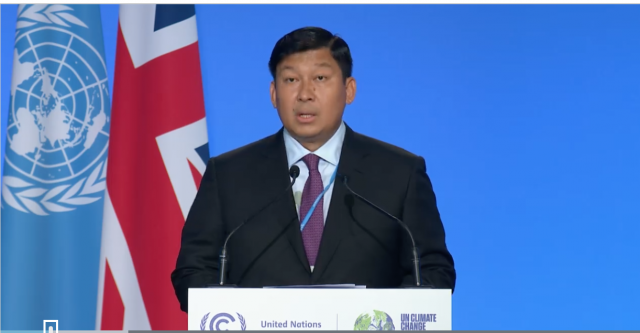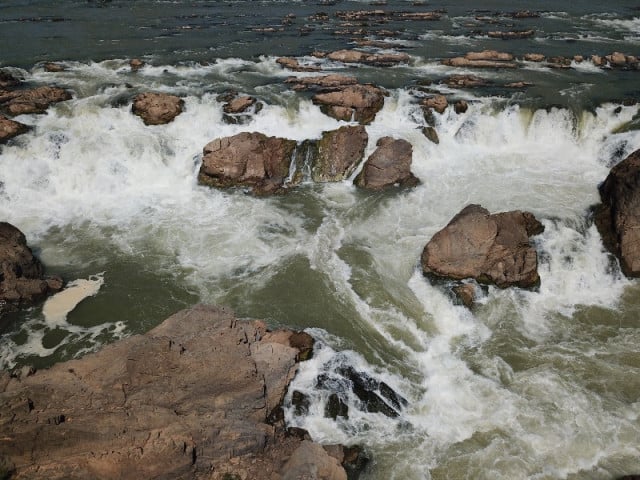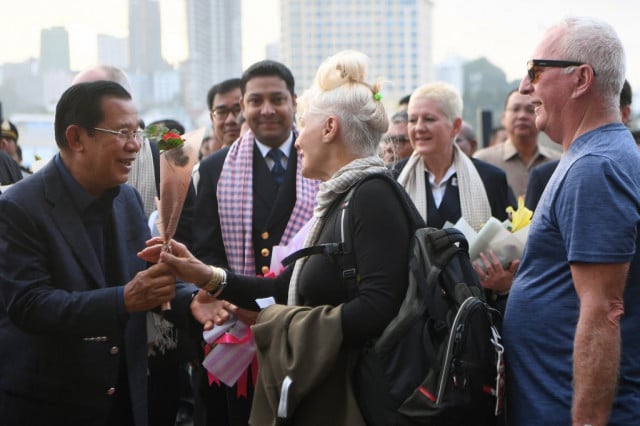Cambodia Makes No New Pledges at COP26, Requests More Funding Instead

- By Sao Phal Niseiy
- November 10, 2021 8:00 PM
Environment Minister Say Samal’s anticipated COP26 debut has disappointed many by failing to take the initiative with any new climate pledges, instead focusing on securing international climate finance
PHNOM PENH--Cambodia on Nov. 10 called for more accessible international climate finance for adaptation but made no new climate pledges at the 26th United Nations Climate Conference (COP26) at Glasgow.
Head of the Cambodian delegation, Environment Minister Say Samal instead of signing new pledges, pointed to actions Cambodia has already taken to preserve the environment, including a moratorium on the construction of new coal power plants and hydroelectric dams on the mainstream Mekong River as the efforts to reduce greenhouse gas emissions. However, three coal plants already planned will still go ahead, with a combined megawattage of 1,625—all of which are under construction.
He noted that as a low-emission country, Cambodia had tripled its climate budge over the past five years, reaching 2 percent of Cambodia’s gross domestic product, roughly equivalent to $500 million. In addition, Cambodia has also commissioned of projects boasting 400 megawatts from solar energy, which will provide around 15 percent of the country’s energy mix—hydro currently makes up 55 percent of Cambodia’s power generation, while more than 40 percent is made up by coal.
“We submitted updated Nationally Determined Contributions (NDCs), targeting 42 percent emission reduction by 2030,” Samal said, adding that the country has also been developing a long-term carbon neutrality strategy, which aims to promote low carbon, resilience and inclusive growth.
In the same speech, Samal said the net-zero targets adopted by larger countries, along with the public and private investments in green technology, represented progress since the 2015 Paris Climate Agreement, however, he added that more actions are needed to keep to the advised 1.5 decree Celsius target.
No New Pledges, Just More Requests for Funding
While failing to commit to new environmental pledges—most notably the Forest and Land Use agreement which, at a time when large-scale illegal logging still plagues Cambodia’s protected areas, could have signaled real change—Samal pointed out that least developed countries were among the most vulnerable to climate change, while they also had the most difficulty in accessing international climate finance.
“International climate finance is far from the required scale, especially for adaptation and is difficult to access for most vulnerable countries,” Samal said.
“We call for developed countries to increase their contributions to financial mechanisms and facilitate further direct access to funds,” Samal added. “Otherwise promoting sustainable climate resilience infrastructure, disaster management capability and low carbon development in Least Developed Countries would barely be empty talk.”
He said that he hoped the summit in Glasgow would address these issues and for the pledges—which he didn’t sign—would become actions.
“We also expect Paris Agreement implementation guidelines to include a strong set rules for carbon markets under Article 6 and will be finalized here to encourage forest protection, sustainable finance for adaptation and mitigation,” he concluded.
Taking to Twitter, UK Ambassador to Cambodia Tina Redshaw decried the government’s minimalist approach at COP26 as “a missed opportunity to show leadership and ambition ahead of ASEAN Chairmanship.”
“Disappointed at the lack of a net-zero emission date and commitment to the forest and land-use declaration and energy day statements,” Redshaw’s tweet read. “Developed countries do need to step up financing but require clear commitment to change unsustainable practices.”
The British diplomatic corps of Cambodia weren’t the only ones disappointed by Samal’s lackluster set of commitments, the Cambodian Youth Network (CYN) issued a statement regarding Cambodia’s unwillingness to endorse the declaration on Forests and Land Use, which is a pivotal step to enable a restoration of the “lungs of the world” by 2030.
CYN, together with 17 other local organizations and forest communities, issued a declaration calling on the government to take more action to end deforestation by creating more space for youth engagement.
This comes after CYN’s own documentation highlighted the consistent encroachment of illegal loggers into indigenous community forested land in Kratie Province—a matter which authorities, both local and national, have either failed or refused to address.
CYN and their partner organizations demanded that the government actually meet its obligations under the Paris Climate Agreement and cease the judicial harassment, detention and mistreatment of youth and environmental activists.
Regarding ending deforestation, CYN’s statement also encouraged COP26 members to pressure the European Union to end all timber imports from Vietnam, arguing that Vietnam has been involved with illegal logging and importing timber from Cambodia for years, a claim that is supported by an Al Jazeera investigation in 2019.















